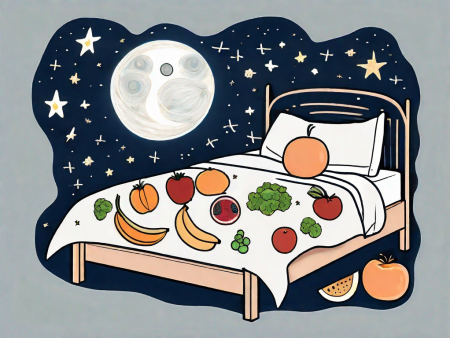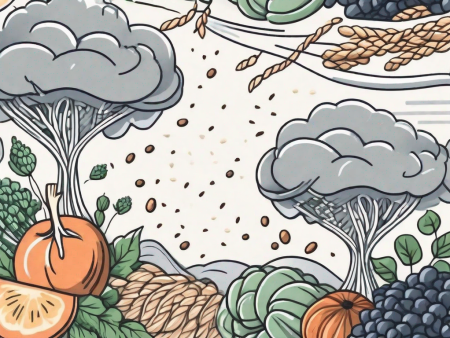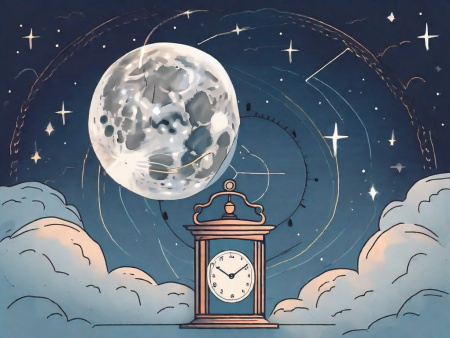Discover the potential benefits of adopting a gluten-free diet for managing depression.
Exploring the Benefits of a Gluten-Free Diet for Depression
Depression, oh depression. It’s like a pesky mosquito that just won’t buzz away. It can drain your energy, dampen your mood, and throw a wrench in your daily routine. But what if I told you that there may be a gluten-free superhero waiting to save the day? Yes, my friend, a gluten-free diet might just be the missing piece in the puzzle of your mental health.
Understanding Depression: A Brief Overview

Before we dive into the depths of a gluten-free diet, let’s shine a spotlight on depression first. It’s a complex beast that affects millions of people worldwide. Depression can manifest itself in various ways, from a persistent feeling of sadness to a lack of interest in activities you once loved. But guess what? Your diet might hold the secret to cracking the code of this mental health conundrum.
Depression is not just a fleeting bout of sadness; it’s a serious mental health condition that can have a profound impact on a person’s life. Imagine waking up every day feeling like you’re carrying a heavy weight on your shoulders, making even the simplest tasks seem overwhelming. Depression can drain your energy, leaving you feeling tired and unmotivated. It can also affect your concentration and memory, making it difficult to focus on work or enjoy hobbies.
But here’s where things get interesting. Recent studies have suggested that there may be a link between mental health and the food we consume. The gut-brain connection, a fascinating and intricate network of communication between our digestive system and brain, is now being explored as a potential factor in mental health disorders. And guess which culprit might be lurking behind the scenes? You got it—gluten!
The Link Between Mental Health and Diet
Now, don’t get me wrong. I’m not saying that scarfing down a gluten-free pizza will magically make your depression disappear. It’s not that simple. However, emerging research has shed light on the possible impact of certain dietary factors on mental health. Gluten, a protein found in wheat, barley, and rye, has been a subject of interest in this regard.
Gluten sensitivity or intolerance is a condition that affects some individuals, causing adverse reactions when they consume gluten-containing foods. While it is commonly associated with digestive symptoms, such as bloating and diarrhea, some studies have suggested that gluten sensitivity may also contribute to mental health issues, including depression and anxiety.
The exact mechanisms behind this potential link are still being investigated, but it is believed that the inflammation triggered by gluten in sensitive individuals could have an impact on brain function and mood regulation. Additionally, some people with depression may find that adopting a gluten-free diet improves their symptoms, although more research is needed to fully understand this connection.
Symptoms and Impact of Depression
Depression is like a dark cloud that loves to cast a shadow over your entire life. It can make you feel tired, unmotivated, and downright blue. Relationships, work, and daily tasks can suddenly seem like Herculean challenges. The emotional toll of depression can be overwhelming, leading to feelings of hopelessness and despair.
Living with depression can also have physical consequences. Sleep disturbances are common, with some individuals experiencing insomnia or oversleeping. Changes in appetite and weight are also frequently observed, with some people losing interest in food while others turn to it for comfort. The combination of these factors can further exacerbate the already complex nature of depression.
But hey, don’t lose hope just yet! Adopting a gluten-free diet could potentially brighten up your world and bring back that pep in your step. While it may not be a cure-all, some individuals with depression have reported improvements in their symptoms after eliminating gluten from their diet. It’s important to note, however, that dietary changes should always be discussed with a healthcare professional to ensure they are appropriate and safe for your specific situation.
The Basics of a Gluten-Free Diet
Alright, buckle up! We’re about to embark on a crash course in the gluten-free universe. First things first, what the heck does gluten-free even mean? Well, put simply, it refers to a diet that excludes gluten—an evil protein found in wheat, barley, and rye. Say adios to your beloved bagels and hello to gluten-free alternatives that might just change your life.
But let’s dive deeper into the world of gluten-free living. Gluten is not just limited to the obvious culprits like breads, pastas, and cereals. It can also hide in unexpected places, like certain sauces and condiments. So, if you’re going gluten-free, you’ll need to become a master at reading labels and deciphering ingredient lists. It’s like being a detective, hunting down every trace of gluten and eliminating it from your diet.
Now, you might be wondering, what can I actually eat on a gluten-free diet? Fear not, my friend, because there’s a whole world of gluten-free goodness out there just waiting to be explored. Imagine indulging in fluffy pancakes made with almond flour, or savoring a warm bowl of quinoa porridge topped with fresh berries. The possibilities are endless!
What Does Gluten-Free Really Mean?
Gluten-free means saying sayonara to foods that contain gluten. Think about avoiding breads, pastas, cereals, and even certain sauces that may contain gluten as a sneaky hidden ingredient. But don’t fret! There’s a whole world of gluten-free goodness out there just waiting to be explored. So put on your adventurous hat and get ready to embark on a culinary journey like no other.
Let’s talk about the benefits of going gluten-free. For individuals with celiac disease or gluten sensitivity, eliminating gluten from their diet can bring about significant improvements in their health. Symptoms such as bloating, abdominal pain, and fatigue can diminish, allowing them to live a more comfortable and energized life. Going gluten-free isn’t just a trendy diet fad—it can be a life-changing decision for those who need it.
Moreover, adopting a gluten-free lifestyle can open up a whole new world of flavors and ingredients. You’ll discover ancient grains like amaranth and teff, which have been enjoyed for centuries in various cultures. These grains not only provide a gluten-free alternative but also bring unique textures and flavors to your meals. And let’s not forget about the wide array of gluten-free flours available, such as coconut flour, tapioca flour, and sorghum flour, which can be used to create delectable baked goods.
Common Foods in a Gluten-Free Diet
Alright, my gluten-free friend. Get ready to discover an abundance of delicious alternatives that will have your taste buds doing a happy dance. From quinoa and buckwheat to rice and corn, there’s no shortage of gluten-free grains and flours to elevate your culinary creations. And let’s not forget about fresh fruits, vegetables, lean proteins, and dairy products. The possibilities are endless—just like the happiness that awaits you!
Let’s take a closer look at some of the gluten-free superstars. Quinoa, often hailed as a complete protein, is a versatile grain that can be used in salads, stir-fries, and even as a substitute for rice. Buckwheat, despite its name, is not related to wheat and is naturally gluten-free. It can be ground into flour to make pancakes, soba noodles, or used as a base for hearty porridge.
When it comes to fruits and vegetables, the gluten-free world is your oyster. From vibrant berries bursting with antioxidants to leafy greens packed with essential vitamins, you’ll have a rainbow of options to choose from. And let’s not forget about lean proteins like chicken, fish, and tofu, which can be prepared in countless delicious ways to satisfy your cravings.
So, my friend, embrace the gluten-free lifestyle with open arms. Explore new flavors, experiment with different ingredients, and let your creativity soar in the kitchen. With a little bit of knowledge and a whole lot of deliciousness, you’ll soon realize that going gluten-free is not just a restriction, but an opportunity to discover a whole new world of culinary delights.
The Connection Between Gluten and Depression
Now that we’ve covered the basics, let’s dig deeper into the relationship between gluten and depression. It turns out that science has been busy unraveling the mysteries of this gluten-depression connection.

Scientific Research on Gluten and Mental Health
Scientists have been whipping up an intellectual storm in the lab, questioning the impact of gluten on our mental well-being. Some studies have shown a link between gluten sensitivity and depressive symptoms, although more research is needed to fully understand the mechanisms at play. So, while we wait for all the answers, why not give the gluten-free lifestyle a whirl and see if it makes a difference for you?
The Role of Inflammation in Depression
Hold on to your gluten-free hats, folks! There’s another aspect to this gluten-depression romance that might just blow your mind—inflammation. It turns out that gluten can be a sneaky little catalyst, triggering inflammation in certain individuals. And guess what inflammation can lead to? You got it—depression and a whole host of other delightful conditions. So, cutting out gluten might just be the superpower you never knew you had.
Transitioning to a Gluten-Free Diet
Transitioning to a gluten-free diet doesn’t have to be a daunting experience. Sure, there may be challenges along the way, but hey, life is all about embracing change and finding the silver linings, right?
Steps to Start a Gluten-Free Lifestyle
Ready to take the gluten-free plunge? Here’s a step-by-step guide to get you started:
- Do your research: Arm yourself with knowledge about gluten-free foods and ingredients.
- Clean out your pantry: Bid farewell to all those gluten-filled goodies that no longer serve you.
- Stock up on gluten-free essentials: Fill your kitchen with gluten-free alternatives that will make your tummy smile.
- Try new recipes: Embrace your inner chef and explore the wonderful world of gluten-free recipes.
- Seek support: Connect with online communities and support groups for tips, advice, and, most importantly, a bit of gluten-free cheerleading.
Challenges and Solutions in Going Gluten-Free
Let’s be real. Transitioning to a gluten-free lifestyle isn’t all rainbows and unicorns. You might encounter hurdles along the way. But fear not! With a little patience, creativity, and some handy tips up your sleeve, you’ll navigate those challenges like a gluten-free pro. So, prepare to face the gluten-free realm head-on and emerge victorious!
The Potential Benefits of a Gluten-Free Diet for Depression
Okay, folks, it’s time for the moment you’ve all been waiting for—the potential benefits of a gluten-free diet for depression. Brace yourself, because we’re about to unveil some incredible ways a gluten-free lifestyle might improve your mental well-being.
Improvements in Mood and Energy Levels
Imagine waking up one day to find your mood bouncing off the walls like an over-caffeinated kangaroo. Well, my friend, a gluten-free diet might just make that dream a reality. Some individuals report feeling more energized and experiencing an improvement in their overall mood after ditching gluten. So, get ready to embrace a life filled with more smiles and high-flying energy!
Long-Term Mental Health Benefits
The benefits of going gluten-free might extend beyond the initial burst of mood improvement. Some studies suggest that following a gluten-free diet could potentially lead to long-term mental health benefits. From reducing depressive symptoms to improving cognitive function, the gluten-free wagon could be your ticket to a happier, healthier brain.
In Conclusion
So there you have it—the compelling case for exploring the benefits of a gluten-free diet for depression. While further research is needed, adopting a gluten-free lifestyle might just be the game-changer you’ve been looking for. Remember, my dear reader, you have the power to take control of your mental health. So why not give gluten the boot and let the sunshine of a gluten-free life brighten your days? Your happiness awaits!







